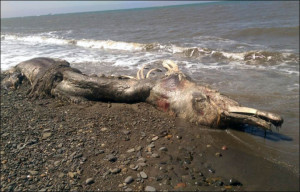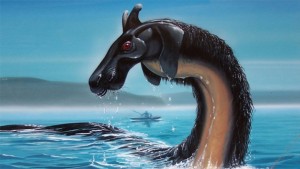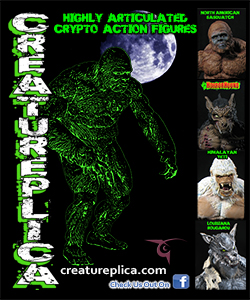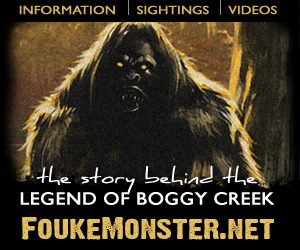Archive for the “Sea Monsters”
Posted by: Craig Woolheater on July 19th, 2015
From terrorist hunter to monster hunter! Jack Rastun was a decorated U.S. Army Ranger, until an unfortunate incident forced him out of the service. He is soon hired by the Foundation for Undocumented Biological Investigation and given a new mission, to search for cryptids, creatures whose existence has not been proven by mainstream science. Teaming up with the daring and beautiful wildlife photographer Karen Thatcher, they must stop a sea monster’s deadly rampage along the Jersey Shore.
Read: Sea Raptor »
Categorized as: Bigfoot Report, Books, Cryptofiction, Cryptozoology, Giant Cryptid Reptiles, Pop Culture, Sea Monsters, Sea Serpents | 1 Comment »
Posted by: Karl Shuker on July 19th, 2015
After extensive research, I finally wrote my long-planned second dragons book – entitled Dragons in Zoology, Cryptozoology, and Culture – and saw it published in 2013 by Coachwhip Publications of Greenville, Ohio. It constitutes one of the most comprehensive dragon-themed factual books ever published, is sumptuously illustrated throughout in full colour, and very recently I was delighted to see not one but two positive, encouraging reviews of it.
Read: Reviewing Dragons in Zoology, Cryptozoology, and Culture »
Categorized as: Books, Cryptozoology, Eyewitness Accounts, Folklore, Fossil Finds, Giant Cryptid Reptiles, Lake Monsters, Living Dinosaurs, Mokele-Mbembe, Movie Monsters, Photos, River Monsters, Sea Monsters, Sea Serpents, ShukerNature, Weird Animal News | Comments Off on Reviewing Dragons in Zoology, Cryptozoology, and Culture
Posted by: Karl Shuker on July 17th, 2015
Exclusive!! Here, making its official public debut, is the front cover for my latest, 22nd book, A Manifestation of Monsters, to be published in September.
Read: A Manifestation of Monsters »
Categorized as: Bigfoot, Books, Coelacanth, Cryptozoologists, Cryptozoology, Flying Humanoids, Lake Monsters, Living Dinosaurs, Men in Cryptozoology, Mothman, Mystery Cats, Sasquatch, Sea Monsters, Sea Serpents, Winged Weirdies | Comments Off on A Manifestation of Monsters
Posted by: Karl Shuker on July 15th, 2015
Everyone has heard of Nessie, the reputed monster of Loch Ness, but fewer people realise that mystery beasts of various forms have also been reported from a sizeable number of other mainland Scottish freshwater lochs. These include Lochs Arkaig, Assynt, Awe, Eil, Feith an Leothaid, Garten, Lochy, Lomond, Maree, Morar, Oich, Quoich. Shiel, and Treig.
Read: Lesser Nessies »
Categorized as: Animal Escapees, Cryptozoology, Eyewitness Accounts, Folklore, Giant Cryptid Reptiles, Lake Monsters, Loch Ness Monster, Sea Monsters, Sea Serpents, ShukerNature | Comments Off on Lesser Nessies
Posted by: Karl Shuker on July 14th, 2015
Mystery beasts come in all sizes and shapes, but in the case of globsters they are most famous not just for their great size but also for their conspicuous lack of any well-defined shape. Aptly named by American cryptozoologist Ivan T. Sanderson in the early 1960s, globsters (also dubbed blobsters or blobs) are generally huge, amorphous masses of decomposing tissue, usually rubbery and covered in fibrous ‘hair’, lacking any recognisable body parts or skeleton, which are regularly washed ashore on beaches around the world.
Read: Globsters Abounding! »
Categorized as: Cryptozoologists, Cryptozoology, Evidence, Eyewitness Accounts, Forensic Science, Globster, Sea Monsters, ShukerNature | Comments Off on Globsters Abounding!
Posted by: Craig Woolheater on July 3rd, 2015

The remains of an unidentified sea animal with fur on its tail have been washed ashore in the Far East. Found near the airport at Shakhtersk, on Sakhalin Island, its appearance is unlike anything ever found in Russia.
Judging from the remains the creature was giant and about twice the length of a human, and it had a huge nose like a bird’s beak.
Read: Mystery Monster Carcass Washes Ashore in Russia »
Categorized as: Bigfoot Report, Cryptozoology, Evidence, Globster, Pop Culture, Sea Monsters | 5 Comments »
Posted by: Craig Woolheater on June 24th, 2015
One of the first thirteen British colonies in North America, Connecticut revels in American patriotism, demonstrated by its nickname the “Constitution State.” Heck, its state song is “Yankee Doodle.” Although it’s the third smallest of the United States by area (110 miles long and 70 miles wide), it’s the fourth most densely populated, and, with 1.9 million acres of forestland, Connecticut can still hide plenty of monsters.
Read: Exploring American Monsters: Connecticut »
Categorized as: Bigfoot Report, Cryptid Canids, Cryptozoology, Eyewitness Accounts, Folklore, Pop Culture, Sea Monsters | 1 Comment »
Posted by: Craig Woolheater on June 17th, 2015
Known for its Wild West history, and great skiing, Colorado also boasts a wealth of dinosaur fossils, is the birthplace of Frank Welker (the voice of Fred from Scooby Doo), and a variety of geography, such as high plains, most of the Southern Rocky Mountains, and desert. The perfect habitats for Bigfoot?
Well, sure. Colorado has a long history of Bigfoot encounters, but “Exploring American Monsters” isn’t about well-known cryptids like Bigfoot, it’s about bizarre hidden monsters like the Slide Rock Bolter.
Read: Exploring American Monsters: Colorado »
Categorized as: Bigfoot, Bigfoot Report, Cryptozoology, Eyewitness Accounts, Folklore, Pop Culture, River Monsters, Sasquatch, Sea Monsters | 1 Comment »
Posted by: Craig Woolheater on June 4th, 2015
Humans have lived in California for at least 15,000 years. In 1848, The United States acquired the area that would one day become the state of California for $15,000,000 after signing the Treaty of Guadalupe Hidalgo, which ended the Mexican-American War. California, famous for Hollywood, the Golden Gate Bridge, and earthquakes, is the most populated state in the union, and the third largest after Alaska and Texas. Outside the large cities (16.37 million people in the greater Los Angeles area) lie great expanses of desert, mountains (including Vasquez Rocks Natural Area Park where Capt. James Kirk battled the Gorn in Star Trek), and forests. Despite the number of people, there’s plenty of room in California for monsters.
Read: Exploring American Monsters: California »
Categorized as: Bigfoot, Bigfoot Report, Cryptozoology, Eyewitness Accounts, Megalodon, Pop Culture, Sasquatch, Sea Monsters | Comments Off on Exploring American Monsters: California
Posted by: Katy Elizabeth on May 17th, 2015
You probably are aware of “Champ” the legendary sea monster of Lake Champlain, often dubbed the American Nessie, referring to Scotland’s Loch Ness Monster. Though no concrete evidence exists, no one has disproved him either. Hundreds of people, spanning several centuries, claim to have seen Champ, though descriptions do vary. Champ has been described as being anywhere from 10 to over 150 feet long. Some sightings claim to have seen humps, some claim Champ is snake-like. Some have seen a horse-like head, while others have seen horns or antlers. The famous Sandra Mansi photograph, taken in the late 1970s, provided a visual view of at least something and experts, who examined the photo, claimed it was not a fake.
Read: Champ Challenge »
Categorized as: Champ Search, Champ/Lake Champlain Monster, Cryptozoologists, Cryptozoology, Evidence, Eyewitness Accounts, Lake Monsters, Photos, Pop Culture, Sea Monsters, Sea Serpents | Comments Off on Champ Challenge
Posted by: Ken Gerhard on April 22nd, 2015
Premieres Wednesday, April 22 at 9 pm CST on Destination America
Vampiric beasts have attacked livestock across southern Texas for years, now scientists DNA test 3 Chupacabra specimens to identify the creature. And, why some believe bones in the Nevada desert prove that the legendary Kraken is more than a myth.
Read: True Supernatural: Chupacabra, Kraken »
Categorized as: Cryptid Canids, Cryptozoologists, Cryptozoology, Evidence, Eyewitness Accounts, Pop Culture, Sea Monsters, Television, Texas Monster Hunter | Comments Off on True Supernatural: Chupacabra, Kraken
Posted by: Craig Woolheater on March 24th, 2015

Watch the event streamed live here starting at 6:30 PM Pacific tonight!
Read: Reminder: Sea Monsters: Fact Or Fiction? »
Categorized as: Bigfoot Report, Cadborosaurus, Cryptozoologists, Cryptozoology, Cryptozoology Conferences, Evidence, Eyewitness Accounts, Lake Monsters, Ogopogo, Pop Culture, Sea Monsters, Sea Serpents, Videos | 1 Comment »
Posted by: Craig Woolheater on March 23rd, 2015

Join the Vancouver Aquarium for a presentation on prehistoric and modern day sea monsters.
Date: Tuesday, March 24, 2015
Time: 6:30 p.m.
Read: Sea Monsters: Fact Or Fiction? »
Categorized as: Bigfoot Report, Cadborosaurus, Cryptozoologists, Cryptozoology, Cryptozoology Conferences, Evidence, Eyewitness Accounts, Lake Monsters, Ogopogo, Pop Culture, Sea Monsters, Sea Serpents, Videos | Comments Off on Sea Monsters: Fact Or Fiction?
Posted by: Craig Woolheater on March 23rd, 2015
Dragons, Bigfoot, chupacabras, unicorns, mermaids. These legendary creatures have captured imaginations, inspired art and culture, and spurred wild speculation. In the new exhibition Mythic Creatures: Dragons, Unicorns, and Mermaids, opening at the Denver Museum of Nature & Science on Friday, March 20, the world’s most enduring fantastical beings come to life through dazzling statues and models—such as a unicorn and 17-foot-long dragon—and are examined more critically through real fossils and cultural objects that have created generations of lore.
Read: Mythic Creatures: Dragons, Unicorns, and Mermaids »
Categorized as: Bigfoot, Bigfoot Report, Chupacabras, Cryptotourism, Cryptozoology, Folklore, Museums, Pop Culture, Replica Cryptia, Sasquatch, Sea Monsters, Sea Serpents, Thunderbirds | Comments Off on Mythic Creatures: Dragons, Unicorns, and Mermaids
Posted by: Karl Shuker on March 9th, 2015
Few cryptozoologists will be unaware of the Naden Harbour carcase – an enigmatic serpentine animal carcase removed from the stomach of a dead whale at a whaling station in Canada’s Queen Charlotte Islands in July 1937, and thought by some cryptozoologists to have been a juvenile Caddy, the elusive sea serpent of Cadboro Bay, British Columbia. Today, this mysterious carcase is long-lost, but three famous photos of it still exist. Far less familiar than the Naden Harbour carcase photographs, conversely, are two Caddy-linked pictures that were first brought to my notice 20 years ago. To my knowledge, they had never previously received any cryptozoological attention, and even today they remain little-publicised.
Read: The Camp Fircom Caddy Carcase – Monster or Montage? »
Categorized as: Cadborosaurus, Cryptozoologists, Cryptozoology, Evidence, Giant Cryptid Reptiles, Photos, Sea Monsters, Sea Serpents, ShukerNature, Skeptical Discussions | Comments Off on The Camp Fircom Caddy Carcase – Monster or Montage?










